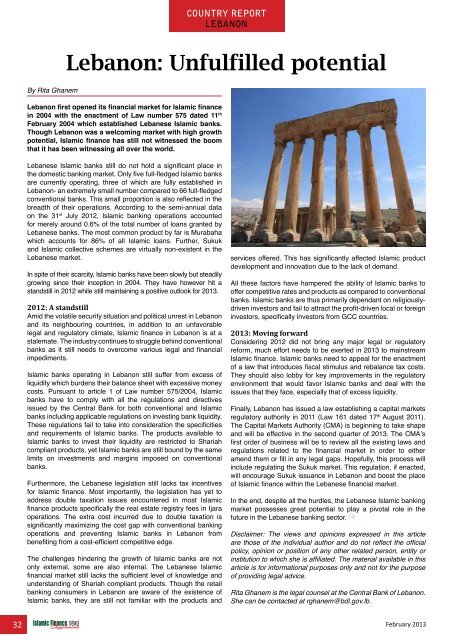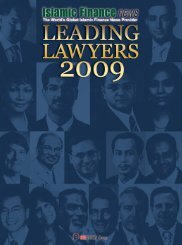View PDF Edition - Islamic Finance News
View PDF Edition - Islamic Finance News
View PDF Edition - Islamic Finance News
You also want an ePaper? Increase the reach of your titles
YUMPU automatically turns print PDFs into web optimized ePapers that Google loves.
country report<br />
Lebanon<br />
By Rita Ghanem<br />
Lebanon: Unfulfilled potential<br />
Lebanon first opened its financial market for <strong>Islamic</strong> finance<br />
in 2004 with the enactment of Law number 575 dated 11 th<br />
February 2004 which established Lebanese <strong>Islamic</strong> banks.<br />
Though Lebanon was a welcoming market with high growth<br />
potential, <strong>Islamic</strong> finance has still not witnessed the boom<br />
that it has been witnessing all over the world.<br />
Lebanese <strong>Islamic</strong> banks still do not hold a significant place in<br />
the domestic banking market. Only five full-fledged <strong>Islamic</strong> banks<br />
are currently operating, three of which are fully established in<br />
Lebanon- an extremely small number compared to 66 full-fledged<br />
conventional banks. This small proportion is also reflected in the<br />
breadth of their operations. According to the semi-annual data<br />
on the 31 st July 2012, <strong>Islamic</strong> banking operations accounted<br />
for merely around 0.6% of the total number of loans granted by<br />
Lebanese banks. The most common product by far is Murabaha<br />
which accounts for 86% of all <strong>Islamic</strong> loans. Further, Sukuk<br />
and <strong>Islamic</strong> collective schemes are virtually non-existent in the<br />
Lebanese market.<br />
In spite of their scarcity, <strong>Islamic</strong> banks have been slowly but steadily<br />
growing since their inception in 2004. They have however hit a<br />
standstill in 2012 while still maintaining a positive outlook for 2013.<br />
2012: A standstill<br />
Amid the volatile security situation and political unrest in Lebanon<br />
and its neighbouring countries, in addition to an unfavorable<br />
legal and regulatory climate, <strong>Islamic</strong> finance in Lebanon is at a<br />
stalemate. The industry continues to struggle behind conventional<br />
banks as it still needs to overcome various legal and financial<br />
impediments.<br />
<strong>Islamic</strong> banks operating in Lebanon still suffer from excess of<br />
liquidity which burdens their balance sheet with excessive money<br />
costs. Pursuant to article 1 of Law number 575/2004, <strong>Islamic</strong><br />
banks have to comply with all the regulations and directives<br />
issued by the Central Bank for both conventional and <strong>Islamic</strong><br />
banks including applicable regulations on investing bank liquidity.<br />
These regulations fail to take into consideration the specificities<br />
and requirements of <strong>Islamic</strong> banks. The products available to<br />
<strong>Islamic</strong> banks to invest their liquidity are restricted to Shariah<br />
compliant products, yet <strong>Islamic</strong> banks are still bound by the same<br />
limits on investments and margins imposed on conventional<br />
banks.<br />
Furthermore, the Lebanese legislation still lacks tax incentives<br />
for <strong>Islamic</strong> finance. Most importantly, the legislation has yet to<br />
address double taxation issues encountered in most <strong>Islamic</strong><br />
finance products specifically the real estate registry fees in Ijara<br />
operations. The extra cost incurred due to double taxation is<br />
significantly maximizing the cost gap with conventional banking<br />
operations and preventing <strong>Islamic</strong> banks in Lebanon from<br />
benefiting from a cost-efficient competitive edge.<br />
The challenges hindering the growth of <strong>Islamic</strong> banks are not<br />
only external, some are also internal. The Lebanese <strong>Islamic</strong><br />
financial market still lacks the sufficient level of knowledge and<br />
understanding of Shariah compliant products. Though the retail<br />
banking consumers in Lebanon are aware of the existence of<br />
<strong>Islamic</strong> banks, they are still not familiar with the products and<br />
services offered. This has significantly affected <strong>Islamic</strong> product<br />
development and innovation due to the lack of demand.<br />
All these factors have hampered the ability of <strong>Islamic</strong> banks to<br />
offer competitive rates and products as compared to conventional<br />
banks. <strong>Islamic</strong> banks are thus primarily dependant on religiouslydriven<br />
investors and fail to attract the profit-driven local or foreign<br />
investors, specifically investors from GCC countries.<br />
2013: Moving forward<br />
Considering 2012 did not bring any major legal or regulatory<br />
reform, much effort needs to be exerted in 2013 to mainstream<br />
<strong>Islamic</strong> finance. <strong>Islamic</strong> banks need to appeal for the enactment<br />
of a law that introduces fiscal stimulus and rebalance tax costs.<br />
They should also lobby for key improvements in the regulatory<br />
environment that would favor <strong>Islamic</strong> banks and deal with the<br />
issues that they face, especially that of excess liquidity.<br />
Finally, Lebanon has issued a law establishing a capital markets<br />
regulatory authority in 2011 (Law 161 dated 17 th August 2011).<br />
The Capital Markets Authority (CMA) is beginning to take shape<br />
and will be effective in the second quarter of 2013. The CMA’s<br />
first order of business will be to review all the existing laws and<br />
regulations related to the financial market in order to either<br />
amend them or fill in any legal gaps. Hopefully, this process will<br />
include regulating the Sukuk market. This regulation, if enacted,<br />
will encourage Sukuk issuance in Lebanon and boost the place<br />
of <strong>Islamic</strong> finance within the Lebanese financial market.<br />
In the end, despite all the hurdles, the Lebanese <strong>Islamic</strong> banking<br />
market possesses great potential to play a pivotal role in the<br />
consulting www.<strong>Islamic</strong><strong>Finance</strong>Consulting.com<br />
www.<strong>Islamic</strong><strong>Finance</strong>Events.com<br />
future in the Lebanese banking sector.<br />
www.<strong>Islamic</strong><strong>Finance</strong><strong>News</strong>.com<br />
www.<strong>Islamic</strong><strong>Finance</strong>Training.com<br />
www.MIFforum.com<br />
www.MIFmonthly.com<br />
www.MIFtraining.com<br />
www.REDmoneyBooks.com<br />
Disclaimer: The views and opinions expressed in this article<br />
are those of the individual author and do not reflect the official<br />
policy, opinion or position of any other related person, entity or<br />
institution to which she is affiliated. The material available in this<br />
article is for informational purposes only and not for the purpose<br />
of providing legal advice.<br />
Rita Ghanem is the legal counsel at the Central Bank of Lebanon.<br />
She can be contacted at rghanem@bdl.gov.lb.<br />
32 February 2013
















